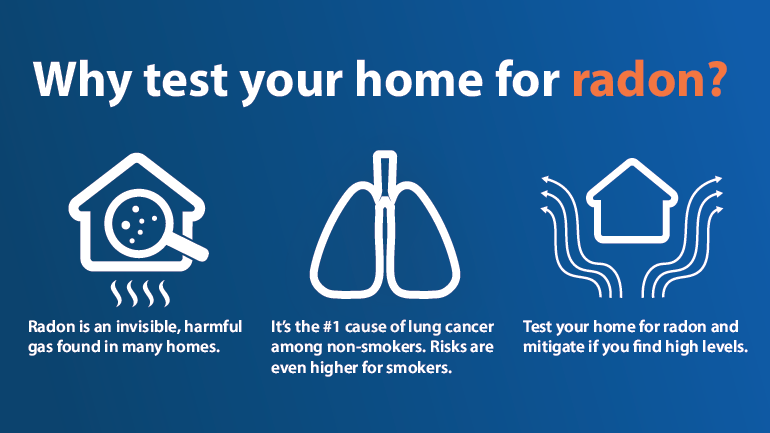
Radon is an invisible radioactive gas released into the air from the decay of uranium, a metal naturally present in some rocks and soils. It can pose a significant health risk indoors.
Radon can enter homes and buildings through cracks and openings in foundations and walls that come in contact with soil.
Indoors, radon concentrations can accumulate to harmful levels, and long-term exposure is linked to lung cancer. Radon is the leading cause of lung cancer among non-smokers, and is attributed to over 3,000 deaths in Canada each year. People who smoke and are exposed to radon have the highest risk.
Radon levels vary from home to home, even for those in the same neighborhood—the only way to know your home's radon levels is to test.
Test kits are available from sources like the BC Lung Foundation, online or by calling 1-800-665-LUNG (5864), Health Canada (Take Action On Radon) and from most home hardware stores.
Testing should be done for at least three months, spanning some of the winter months. You can also test over a few days to weeks, using a short-term detector, to get an idea of the levels in your home.
Some libraries, including Coquitlam and Fraser Valley Regional libraries lend short-term radon detectors at no charge. Since levels can vary day to day, short-term testing should always be followed by longer term testing.
Health Canada advises that mitigation be conducted if levels are above 200 Becquerels per metre cubed (Bq/m3).
Mitigation is effective at lowering concentrations, and it typically involves a venting system to move radon-containing air from inside to outside before it reaches lived-in spaces.
Canadian Lung Association offers a grant to support homeowners to carry out radon mitigation.
If your home has high radon levels, and you are a smoker, quitting smoking will also help lower your lung cancer risk. Talk to your health care provider and visit our resources for more information on quitting smoking. This winter, test your home for radon and encourage your friends and family to do the same.
Learn more at fraserhealth.ca/radon, including where to get a radon test kit and resources for renters and homeowners.


